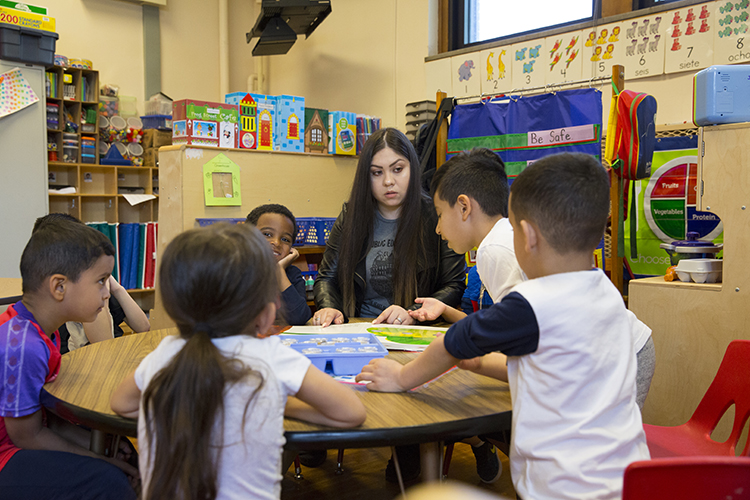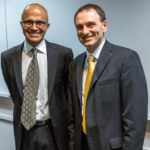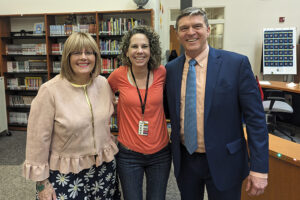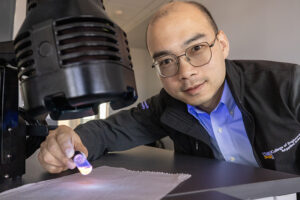Guadalupe Rodriguez works with 4-year-olds at Morgandale School as a paraprofessional. Her class is a mix of youngsters, some of whom have special needs.
“I love working with kids with special needs,” she says. “Over the summer I worked with kids with autism, and that led me to working in a school setting with them.”
Rodriguez had thought of going back to school to become a certified teacher, but couldn’t really afford to quit her job to do that.
Now a new effort, the PLUS program, is helping her and other paraprofessionals in Milwaukee Public Schools work toward becoming certified teachers while continuing to work.
Collaborating to fill a need
The new collaborative program involving the M³ (M-cubed) partners – MPS, University of Wisconsin-Milwaukee and Milwaukee Area Technical College – is helping the motivated classroom helpers like Rodriguez prepare to lead their own classrooms. The PLUS (Professional Licensure with Undergraduate Support) program was developed by Judith Winn, an associate professor at UWM, now retired; Adria Maddaleni, operations manager, MPS Office of School Administrators; and Jennifer Mikulay, associate dean, MATC School of Liberal Arts and Sciences and director of the Center for Engaged and Service Learning.
“We thought there was an untapped group in MPS of paraprofessionals who don’t have college degrees,” said Winn. “People who have the skills and the desire but haven’t been able to go back to college and get a degree.”
Principals nominate the paraprofessionals for the program – Rodriguez was nominated by her former principal, Brenda Martinez, at ALBA (Academia de Lenguaje y Bellas Artes) School. Once nominated and accepted, the PLUS students are able to complete their pre-professional courses at MATC, moving to UWM for the professional coursework and to earn special education teacher certification. They will be able to continue working as paraprofessionals, doing their student teaching on-the-job by gradually assuming more planning and teaching responsibilities.
Each paraprofessional will be mentored by a strong lead teacher in their school.
Mary Stone, PLUS program coordinator, describes a meeting with a woman talking with emotion about her desire to become a teacher. “She said, ‘I wanted to be a teacher for so long, and I just couldn’t find a way to do this. This is the way I’m going to be able to make this dream a reality.”
Can’t afford to quit working
The challenge for many paraprofessionals, like Rodriguez, is not just finding money for tuition, but also the fact that they can’t afford to quit working to go to college.
Aspiring teachers receive some financial support for tuition through a U.S. Department of Education grant received by UWM’s Kristen Taylor and Donna Pasternak to help provide a pipeline of prepared teachers experienced in culturally relevant practices.The Tuition Assistance program through MPS also helps. However, the cost of completing degrees goes beyond what the project provides now, and the partners will be approaching local philanthropists for additional financial support, according to Winn.
The initial program is set up for special education teachers, but the hope is that it will eventually be expanded to recruit and prepare teachers for other areas, such as bilingual education.
“The special education paraprofessionals are so excited about this,” Stone said. “What we’re seeing is a group of nontraditional students who are already skilled and very passionate about working in special education.”
Students are at MATC now, with the hope the numbers will grow to 23 or 24 by fall. At least two students are getting ready to transfer from MPS to UWM, and the program is planning to recruit the next group.
‘A community in need’
Rodriguez completed her second semester at MATC in May. One of the reasons she likes the PLUS program is that her college teachers work with the paraprofessionals to schedule classes around their work hours. She is bilingual and her eventual goal is to become certified in both bilingual education and special education for early childhood.
She plans to stay in MPS. “I think it’s best for us to stay within our community to help others because it’s a community in need.”
“This (the PLUS program) is one of the strongest collaborations I’ve been involved in,” said Winn. “It’s been a delight to work on this project. What we’re seeing is a huge desire for this type of program. It’s so wonderful to be able to support them.”






